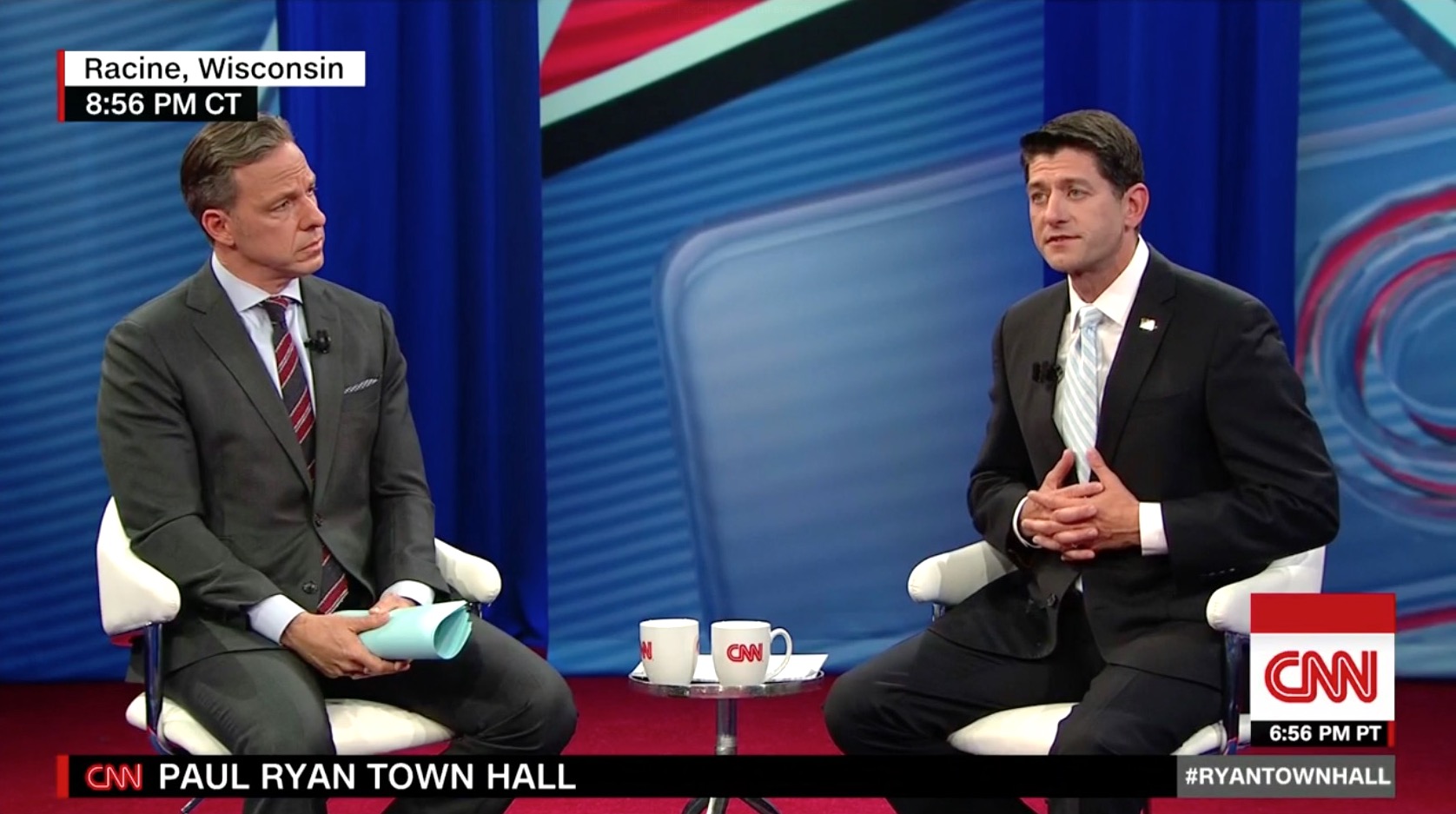Paul Ryan said Trump 'messed up' in his post-Charlottesville comments, wishes he wouldn't tweet so much


A free daily email with the biggest news stories of the day – and the best features from TheWeek.com
You are now subscribed
Your newsletter sign-up was successful
At a CNN town hall forum in Racine, Wisconsin, on Monday, House Speaker Paul Ryan addressed President Trump's various comments in the wake of a white supremacist rally in Charlottesville, Virginia, over the previous week. He told one constituent that he believes Trump was "pitch perfect" in his remarks on white supremacists and neo-Nazis a week ago Monday, but added, "I do believe that he messed up in his comments on Tuesday, when it sounded like a moral equivocation or at the very least moral ambiguity when we need extreme moral clarity." He added that he doesn't support a motion to censure Trump because he doesn't want condemning white supremacy to turn into a "partisan food fight."
If he appeared a little hesitant to criticize Trump, Ryan was happy to scold the Senate for not passing a health-care reform bill — part of the audience cheered when he mentioned the bill's failure, which he took in stride — and he encouraged the upper chamber to revisit the legislation. He optimistically predicted that "it's going to be far easier for us to do tax reform than it was for, say, health-care reform," because of Senate rules that Majority Leader Mitch McConnell (R-Ky.) invoked so no Democratic votes would be needed.
Ryan also said he wished Trump would tweet less, and there are "some of those tweets that I'd prefer not to have seen," but he is only responsible for his actions and Trump probably isn't going to change his Twitter habits. Which seems fair — White House Chief of Staff John Kelly can't tame Trump's tweeting habits, and the House speaker has enough other things on his plate. In September, for example, Ryan actually needs to shepherd through a budget, fund the government, and pass legislation to raise the debt ceiling. He did not address those must-pass bills at the CNN town hall.
The Week
Escape your echo chamber. Get the facts behind the news, plus analysis from multiple perspectives.

Sign up for The Week's Free Newsletters
From our morning news briefing to a weekly Good News Newsletter, get the best of The Week delivered directly to your inbox.
From our morning news briefing to a weekly Good News Newsletter, get the best of The Week delivered directly to your inbox.
A free daily email with the biggest news stories of the day – and the best features from TheWeek.com
Peter has worked as a news and culture writer and editor at The Week since the site's launch in 2008. He covers politics, world affairs, religion and cultural currents. His journalism career began as a copy editor at a financial newswire and has included editorial positions at The New York Times Magazine, Facts on File, and Oregon State University.
-
 The ‘ravenous’ demand for Cornish minerals
The ‘ravenous’ demand for Cornish mineralsUnder the Radar Growing need for critical minerals to power tech has intensified ‘appetite’ for lithium, which could be a ‘huge boon’ for local economy
-
 Why are election experts taking Trump’s midterm threats seriously?
Why are election experts taking Trump’s midterm threats seriously?IN THE SPOTLIGHT As the president muses about polling place deployments and a centralized electoral system aimed at one-party control, lawmakers are taking this administration at its word
-
 ‘Restaurateurs have become millionaires’
‘Restaurateurs have become millionaires’Instant Opinion Opinion, comment and editorials of the day
-
 NIH director Bhattacharya tapped as acting CDC head
NIH director Bhattacharya tapped as acting CDC headSpeed Read Jay Bhattacharya, a critic of the CDC’s Covid-19 response, will now lead the Centers for Disease Control and Prevention
-
 Witkoff and Kushner tackle Ukraine, Iran in Geneva
Witkoff and Kushner tackle Ukraine, Iran in GenevaSpeed Read Steve Witkoff and Jared Kushner held negotiations aimed at securing a nuclear deal with Iran and an end to Russia’s war in Ukraine
-
 Pentagon spokesperson forced out as DHS’s resigns
Pentagon spokesperson forced out as DHS’s resignsSpeed Read Senior military adviser Col. David Butler was fired by Pete Hegseth and Homeland Security spokesperson Tricia McLaughlin is resigning
-
 Judge orders Washington slavery exhibit restored
Judge orders Washington slavery exhibit restoredSpeed Read The Trump administration took down displays about slavery at the President’s House Site in Philadelphia
-
 Hyatt chair joins growing list of Epstein files losers
Hyatt chair joins growing list of Epstein files losersSpeed Read Thomas Pritzker stepped down as executive chair of the Hyatt Hotels Corporation over his ties with Jeffrey Epstein and Ghislaine Maxwell
-
 Judge blocks Hegseth from punishing Kelly over video
Judge blocks Hegseth from punishing Kelly over videoSpeed Read Defense Secretary Pete Hegseth pushed for the senator to be demoted over a video in which he reminds military officials they should refuse illegal orders
-
 Trump’s EPA kills legal basis for federal climate policy
Trump’s EPA kills legal basis for federal climate policySpeed Read The government’s authority to regulate several planet-warming pollutants has been repealed
-
 House votes to end Trump’s Canada tariffs
House votes to end Trump’s Canada tariffsSpeed Read Six Republicans joined with Democrats to repeal the president’s tariffs
